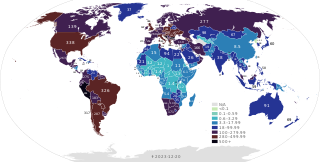Related Research Articles

Public Health England (PHE) was an executive agency of the Department of Health and Social Care in England which began operating on 1 April 2013 to protect and improve health and wellbeing and reduce health inequalities. Its formation came as a result of the reorganisation of the National Health Service (NHS) in England outlined in the Health and Social Care Act 2012. It took on the role of the Health Protection Agency, the National Treatment Agency for Substance Misuse and a number of other health bodies. It was an executive agency of the Department of Health and Social Care, and a distinct delivery organisation with operational autonomy.

Our World in Data (OWID) is a scientific online publication that focuses on large global problems such as poverty, disease, hunger, climate change, war, existential risks, and inequality.

Irene Mary Carmel Tracey is Vice-Chancellor of the University of Oxford and former Warden of Merton College, Oxford. She is also Professor of Anaesthetic Neuroscience in the Nuffield Department of Clinical Neurosciences and formerly Pro-Vice-Chancellor at the University of Oxford. She is a co-founder of the Oxford Centre for Functional Magnetic Resonance Imaging of the Brain (FMRIB), now the Wellcome Centre for Integrative Neuroimaging. Her team’s research is focused on the neuroscience of pain, specifically pain perception and analgesia as well as how anaesthetics produce altered states of consciousness. Her team uses multidisciplinary approaches including neuroimaging.

Devi Lalita Sridhar FRSE is an American public health researcher, who is both professor and chair of global public health at the University of Edinburgh, Scotland. Her research considers the effectiveness of public health interventions and how to improve developmental assistance for health. Sridhar directs the University of Edinburgh's Global Health Governance Programme which she established in 2014.

The COVID-19 pandemic, also known as the coronavirus pandemic, is a global pandemic of coronavirus disease 2019 (COVID-19) caused by severe acute respiratory syndrome coronavirus 2 (SARS-CoV-2). The novel virus was first identified in an outbreak in Wuhan, the capital of Hubei, China, in December 2019, before it spread to other areas of Asia, and then worldwide in early 2020. The World Health Organization (WHO) declared the outbreak a public health emergency of international concern (PHEIC) on 30 January 2020, and assessed the outbreak had become a pandemic on 11 March 2020. The WHO ended the PHEIC on 5 May 2023. As of 4 April 2024, the pandemic has caused 7,040,264 confirmed deaths, making it the fifth deadliest pandemic or epidemic in history.

This is a general overview and status of places affected by severe acute respiratory syndrome coronavirus 2 (SARS-CoV-2), the virus which causes coronavirus disease 2019 (COVID-19) and is responsible for the COVID-19 pandemic. The first human cases of COVID-19 were identified in Wuhan, the capital of the province of Hubei in China in December 2019.

The article contains the number of cases of coronavirus disease 2019 (COVID-19) reported by each country, territory, and subnational area to the World Health Organization (WHO) and published in WHO reports, tables, and spreadsheets. As of 4 April 2024, 774,954,379 cases have been stated by government agencies from around the world to be confirmed. For more international statistics in table and map form, see COVID-19 pandemic by country and territory.
The COVID-19 pandemic in the United Kingdom is a part of the worldwide pandemic of coronavirus disease 2019 (COVID-19) caused by severe acute respiratory syndrome coronavirus 2 (SARS-CoV-2). In the United Kingdom, it has resulted in 24,911,885 confirmed cases, and is associated with 232,112 deaths.

The Public Health Act 1984 is a piece of legislation for England and Wales which requires physicians to notify the 'proper officer' of the local authority of any person deemed to be suffering from a notifiable disease. It also provides powers to isolate infected individuals to prevent the spread of such a disease. The act forms the basis of various legislation connected to the COVID-19 pandemic in the United Kingdom.

This article contains the monthly cumulative number of deaths from the pandemic of coronavirus disease 2019 (COVID-19) reported by each country, territory, and subnational area to the World Health Organization (WHO) and published in WHO reports, tables, and spreadsheets. There are also maps and timeline graphs of daily and weekly deaths worldwide.
Anna Louise Hansell is a British physician who is Professor of Environmental Epidemiology and Director of the Centre for Environmental Health and Sustainability at the University of Leicester. During the COVID-19 pandemic, Hansell studied the relationship between pollution and COVID-19.

This article contains the number of confirmed COVID-19 deaths per population as of 4 April 2024, by country. It also has cumulative death totals by country. For these numbers over time see the tables, graphs, and maps at COVID-19 pandemic deaths and COVID-19 pandemic by country and territory.
Azeem Majeed is a Professor and Head of the Department of Primary Care & Public Health at Imperial College, London, as well as a general practitioner in South London and a consultant in public health. In the most recent UK University Research Excellence Framework results, Imperial College London was the highest ranked university in the UK for the quality of research in the “Public Health, Health Services and Primary Care” unit of assessment.

The COVID-19 pandemic has revealed race-based health care disparities in many countries, including the United States, United Kingdom, Norway, Sweden, Canada, and Singapore. These disparities are believed to originate from structural racism in these countries which pre-dates the pandemic; a commentary in The BMJ noted that "ethnoracialised differences in health outcomes have become the new normal across the world" as a result of ethnic and racial disparities in COVID-19 healthcare, determined by social factors. Data from the United States and elsewhere shows that minorities, especially black people, have been infected and killed at a disproportionate rate to white people.
This article presents official statistics gathered during the COVID-19 pandemic in the United Kingdom.

The CDC publishes official numbers of COVID-19 cases in the United States. The CDC estimates that, between February 2020 and September 2021, only 1 in 1.3 COVID-19 deaths were attributed to COVID-19. The true COVID-19 death toll in the United States would therefore be higher than official reports, as modeled by a paper published in The Lancet Regional Health – Americas. One way to estimate COVID-19 deaths that includes unconfirmed cases is to use the excess mortality, which is the overall number of deaths that exceed what would normally be expected. From March 1, 2020, through the end of 2020, there were 522,368 excess deaths in the United States, or 22.9% more deaths than would have been expected in that time period.

The COVID-19 Genomics UK (COG-UK) consortium was a group of academic institutions and public health agencies in the United Kingdom created in April 2020 to collect, sequence and analyse genomes of SARS-CoV-2 at scale, as part of COVID-19 pandemic response.
There are various factors affecting the health of ethnic minorities in the UK due to health inequalities. The term "BAME" is often used however, the use of this term can be problematic for various reasons, such as an indicating power relations and also having a focus on skin colour. Therefore, this article will use the term ethnic minorities.
Kamlesh Khunti is a British physician who is Professor of Primary Care Diabetes and Vascular Medicine at the University of Leicester. His research considers diabetes and public health. During the COVID-19 pandemic, Khunti studied the impact of COVID-19 on people living with diabetes. He served on the Scientific Advisory Group for Emergencies (SAGE). He is the director of the National Institute for Health and Care Research (NIHR) Applied Research Collaboration East Midlands.
Cheryl Cohen is a South African public health researcher who is a professor at the University of the Witwatersrand. She looks to develop evidence-based policy to reduce the burdens of respiratory diseases. During the COVID-19 pandemic. Cohen investigated the rates of COVID-19 in South Africa.
References
- 1 2 3 "Clare Griffiths - UK Health Security Agency". ukhsa.blog.gov.uk. Retrieved 21 December 2021.
- 1 2 3 "Statistics are vital: An interview with Clare Griffiths". RSS. Retrieved 21 December 2021.
- ↑ "Explore the Data: The UK Covid-19 Dashboard". the-sra.org.uk. Retrieved 21 December 2021.
- ↑ "BBC Radio 4 - More or Less: Behind the Stats, In praise of Covid Data". BBC. 27 March 2021. Retrieved 21 December 2021.
- ↑ "Behind the scenes of the coronavirus dashboard - the government's most popular ever web page". inews.co.uk. 12 February 2021. Retrieved 21 December 2021.
- ↑ "The female 'data lads' crunching Covid numbers and keeping us informed through the pandemic". inews.co.uk. 21 December 2021. Retrieved 21 December 2021.